Leadership and Management: Uber's Operational Strategies and Analysis
VerifiedAdded on 2023/01/05
|15
|4610
|50
Report
AI Summary
This report provides a comprehensive analysis of leadership and management practices within Uber Technologies. It begins by differentiating between the roles and characteristics of leaders and managers, highlighting their distinct responsibilities and contributions to the organization. The report explores the roles of leaders and managers in various situational contexts, illustrating how their approaches vary depending on the specific challenges and opportunities faced by the company. It delves into prominent leadership theories and models, including situational, contingency, and system leadership, evaluating their strengths and weaknesses in the context of Uber's operations. The report examines the impact of these leadership approaches on management and operational efficiency, emphasizing how leaders and managers can work together to achieve business objectives. It also considers the factors influencing operational management and decision-making within Uber's dynamic business environment, including the gig economy. The analysis covers the application of operations management principles and their impact on the broader business environment, offering insights into Uber's strategies for maintaining a competitive edge in the transportation and delivery industries.
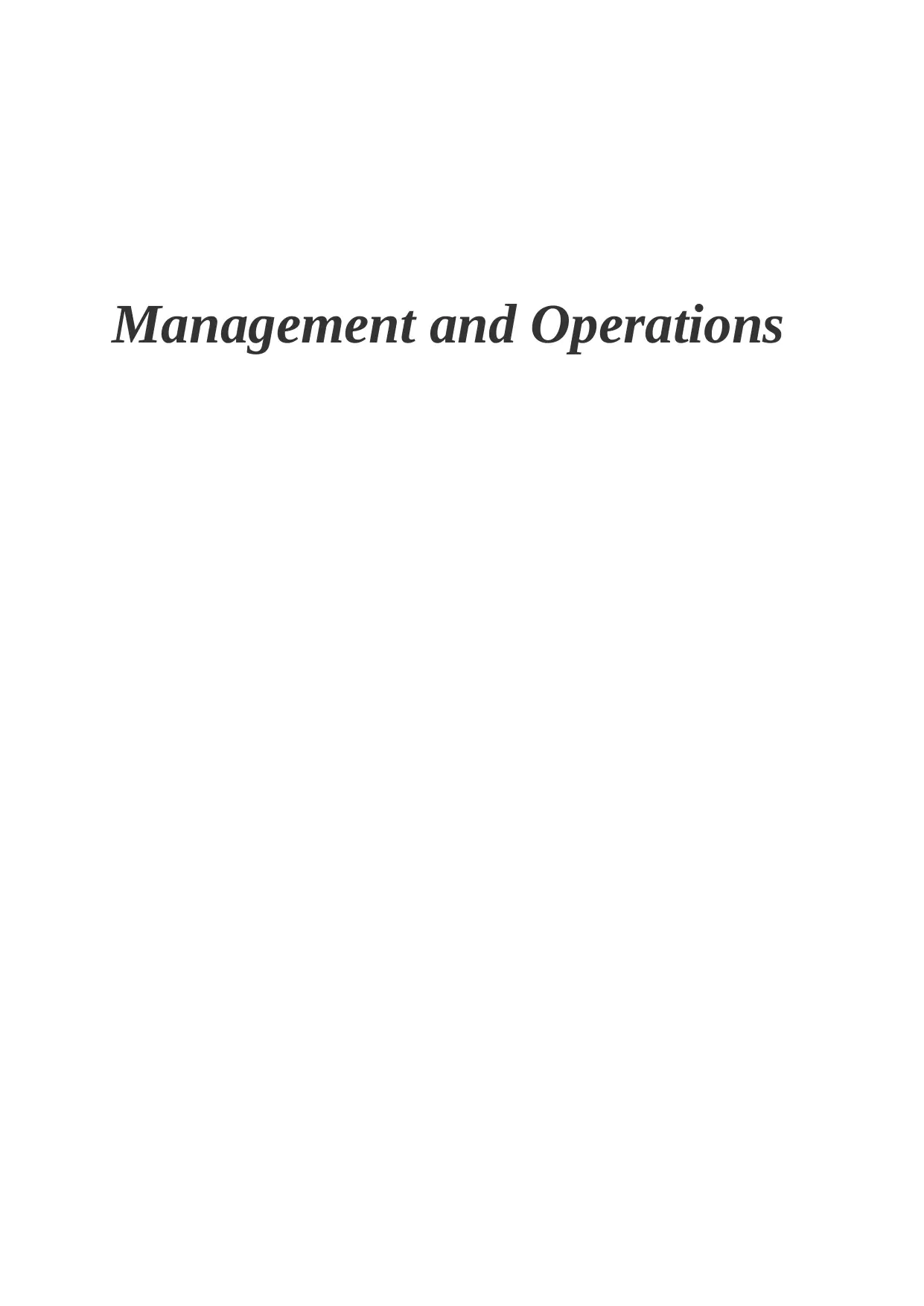
Management and Operations
Paraphrase This Document
Need a fresh take? Get an instant paraphrase of this document with our AI Paraphraser
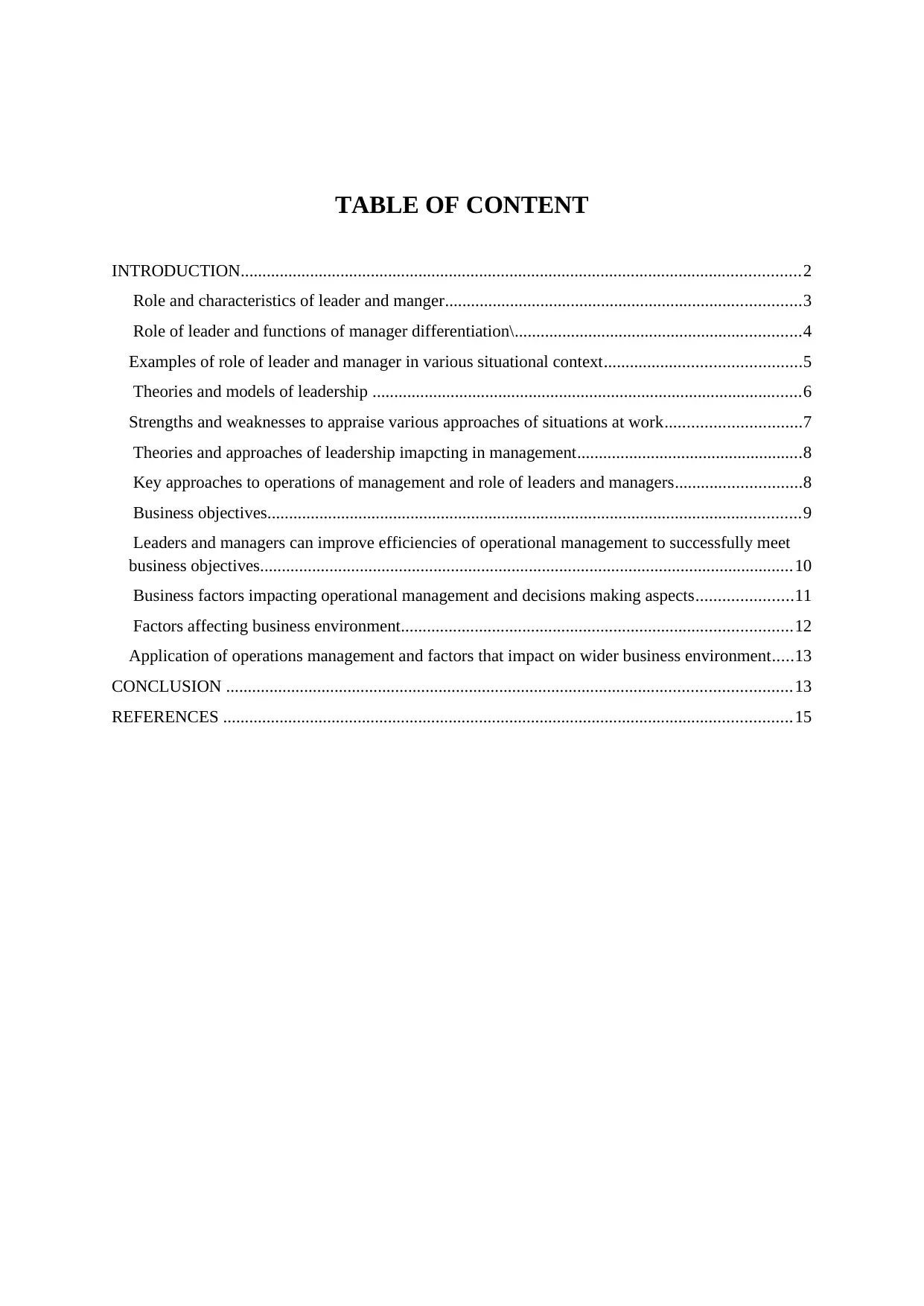
TABLE OF CONTENT
INTRODUCTION.................................................................................................................................2
Role and characteristics of leader and manger..................................................................................3
Role of leader and functions of manager differentiation\..................................................................4
Examples of role of leader and manager in various situational context.............................................5
Theories and models of leadership ...................................................................................................6
Strengths and weaknesses to appraise various approaches of situations at work...............................7
Theories and approaches of leadership imapcting in management....................................................8
Key approaches to operations of management and role of leaders and managers.............................8
Business objectives...........................................................................................................................9
Leaders and managers can improve efficiencies of operational management to successfully meet
business objectives...........................................................................................................................10
Business factors impacting operational management and decisions making aspects......................11
Factors affecting business environment..........................................................................................12
Application of operations management and factors that impact on wider business environment.....13
CONCLUSION ..................................................................................................................................13
REFERENCES ...................................................................................................................................15
INTRODUCTION.................................................................................................................................2
Role and characteristics of leader and manger..................................................................................3
Role of leader and functions of manager differentiation\..................................................................4
Examples of role of leader and manager in various situational context.............................................5
Theories and models of leadership ...................................................................................................6
Strengths and weaknesses to appraise various approaches of situations at work...............................7
Theories and approaches of leadership imapcting in management....................................................8
Key approaches to operations of management and role of leaders and managers.............................8
Business objectives...........................................................................................................................9
Leaders and managers can improve efficiencies of operational management to successfully meet
business objectives...........................................................................................................................10
Business factors impacting operational management and decisions making aspects......................11
Factors affecting business environment..........................................................................................12
Application of operations management and factors that impact on wider business environment.....13
CONCLUSION ..................................................................................................................................13
REFERENCES ...................................................................................................................................15
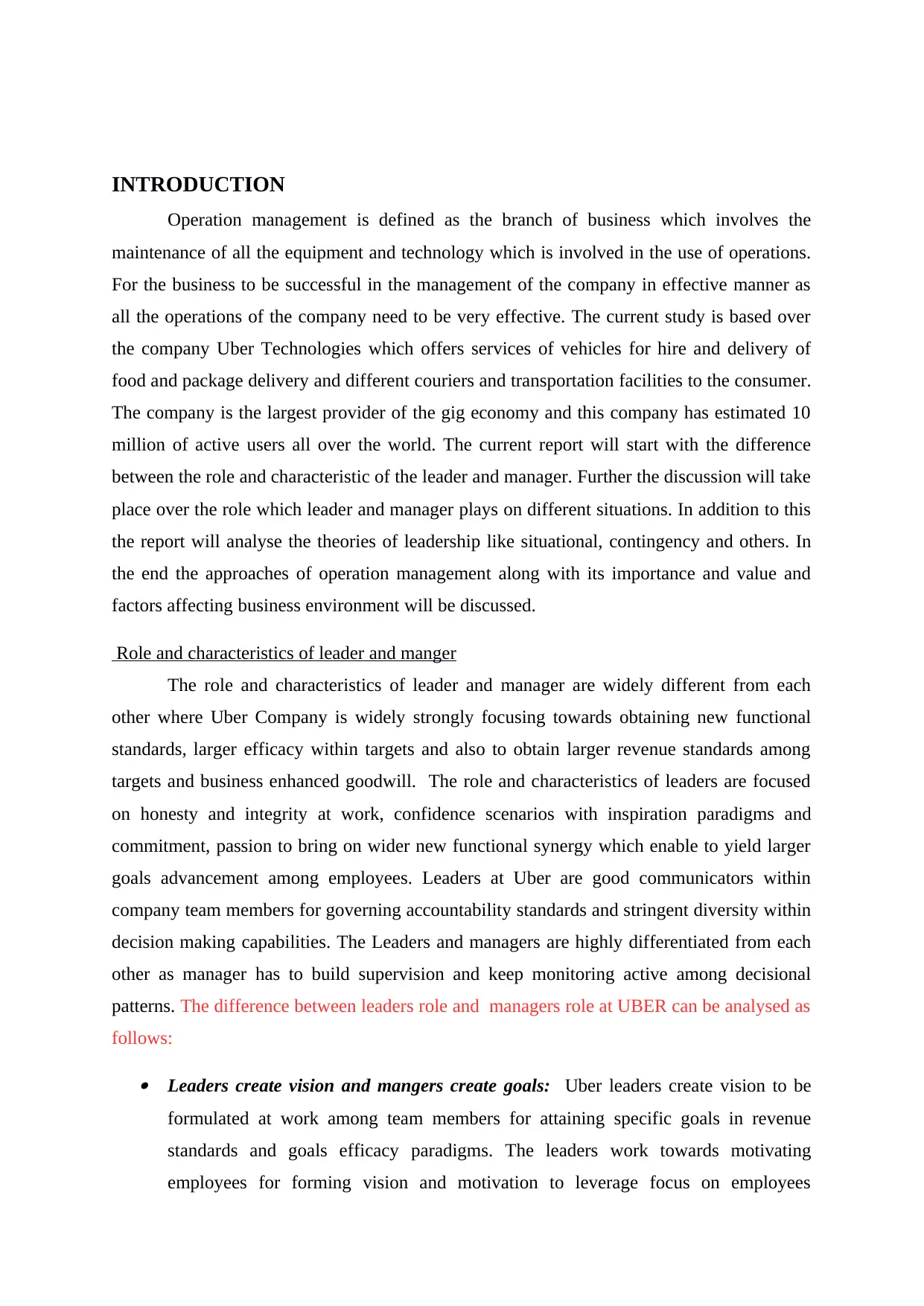
INTRODUCTION
Operation management is defined as the branch of business which involves the
maintenance of all the equipment and technology which is involved in the use of operations.
For the business to be successful in the management of the company in effective manner as
all the operations of the company need to be very effective. The current study is based over
the company Uber Technologies which offers services of vehicles for hire and delivery of
food and package delivery and different couriers and transportation facilities to the consumer.
The company is the largest provider of the gig economy and this company has estimated 10
million of active users all over the world. The current report will start with the difference
between the role and characteristic of the leader and manager. Further the discussion will take
place over the role which leader and manager plays on different situations. In addition to this
the report will analyse the theories of leadership like situational, contingency and others. In
the end the approaches of operation management along with its importance and value and
factors affecting business environment will be discussed.
Role and characteristics of leader and manger
The role and characteristics of leader and manager are widely different from each
other where Uber Company is widely strongly focusing towards obtaining new functional
standards, larger efficacy within targets and also to obtain larger revenue standards among
targets and business enhanced goodwill. The role and characteristics of leaders are focused
on honesty and integrity at work, confidence scenarios with inspiration paradigms and
commitment, passion to bring on wider new functional synergy which enable to yield larger
goals advancement among employees. Leaders at Uber are good communicators within
company team members for governing accountability standards and stringent diversity within
decision making capabilities. The Leaders and managers are highly differentiated from each
other as manager has to build supervision and keep monitoring active among decisional
patterns. The difference between leaders role and managers role at UBER can be analysed as
follows:
Leaders create vision and mangers create goals: Uber leaders create vision to be
formulated at work among team members for attaining specific goals in revenue
standards and goals efficacy paradigms. The leaders work towards motivating
employees for forming vision and motivation to leverage focus on employees
Operation management is defined as the branch of business which involves the
maintenance of all the equipment and technology which is involved in the use of operations.
For the business to be successful in the management of the company in effective manner as
all the operations of the company need to be very effective. The current study is based over
the company Uber Technologies which offers services of vehicles for hire and delivery of
food and package delivery and different couriers and transportation facilities to the consumer.
The company is the largest provider of the gig economy and this company has estimated 10
million of active users all over the world. The current report will start with the difference
between the role and characteristic of the leader and manager. Further the discussion will take
place over the role which leader and manager plays on different situations. In addition to this
the report will analyse the theories of leadership like situational, contingency and others. In
the end the approaches of operation management along with its importance and value and
factors affecting business environment will be discussed.
Role and characteristics of leader and manger
The role and characteristics of leader and manager are widely different from each
other where Uber Company is widely strongly focusing towards obtaining new functional
standards, larger efficacy within targets and also to obtain larger revenue standards among
targets and business enhanced goodwill. The role and characteristics of leaders are focused
on honesty and integrity at work, confidence scenarios with inspiration paradigms and
commitment, passion to bring on wider new functional synergy which enable to yield larger
goals advancement among employees. Leaders at Uber are good communicators within
company team members for governing accountability standards and stringent diversity within
decision making capabilities. The Leaders and managers are highly differentiated from each
other as manager has to build supervision and keep monitoring active among decisional
patterns. The difference between leaders role and managers role at UBER can be analysed as
follows:
Leaders create vision and mangers create goals: Uber leaders create vision to be
formulated at work among team members for attaining specific goals in revenue
standards and goals efficacy paradigms. The leaders work towards motivating
employees for forming vision and motivation to leverage focus on employees
⊘ This is a preview!⊘
Do you want full access?
Subscribe today to unlock all pages.

Trusted by 1+ million students worldwide
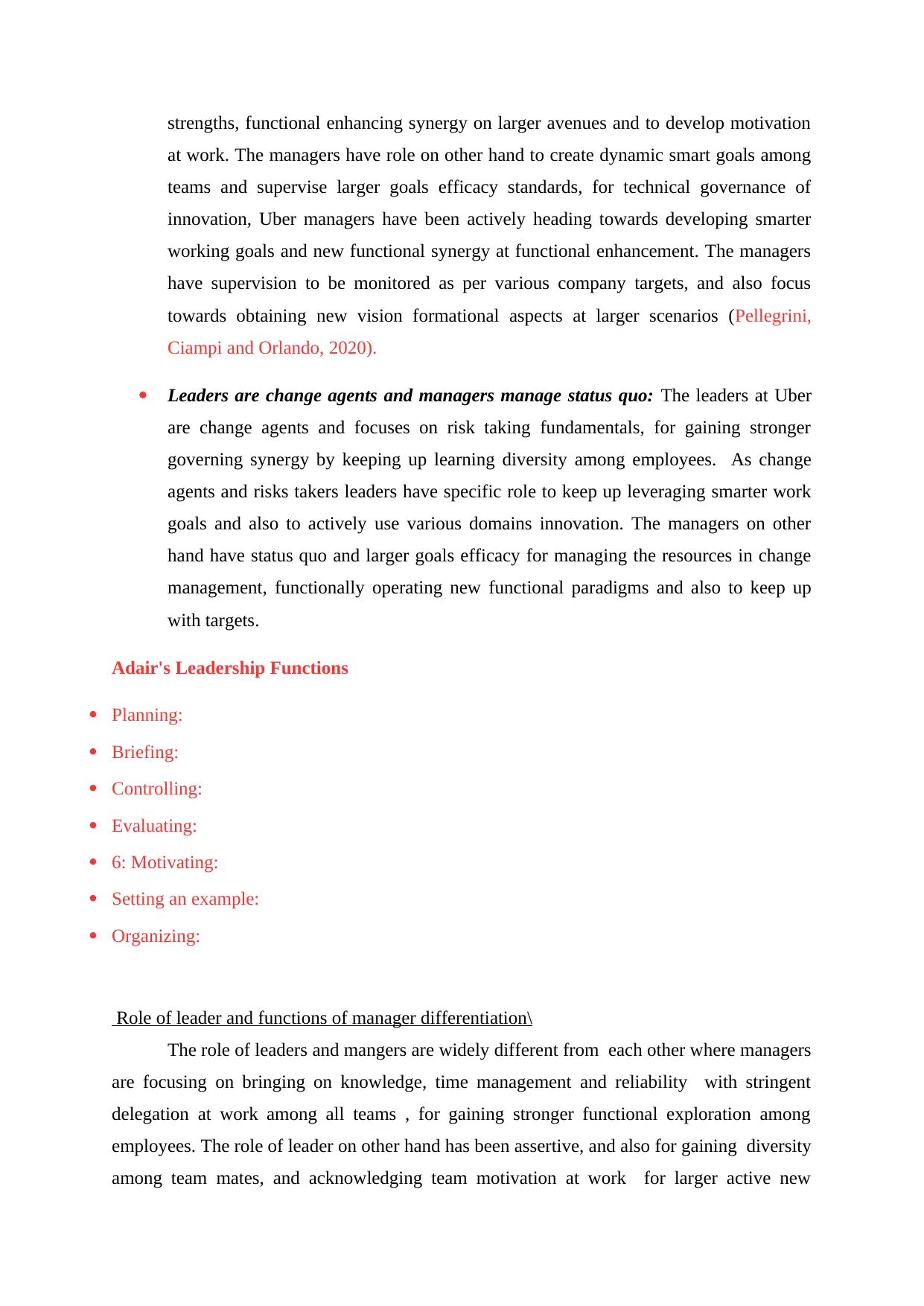
strengths, functional enhancing synergy on larger avenues and to develop motivation
at work. The managers have role on other hand to create dynamic smart goals among
teams and supervise larger goals efficacy standards, for technical governance of
innovation, Uber managers have been actively heading towards developing smarter
working goals and new functional synergy at functional enhancement. The managers
have supervision to be monitored as per various company targets, and also focus
towards obtaining new vision formational aspects at larger scenarios (Pellegrini,
Ciampi and Orlando, 2020).
Leaders are change agents and managers manage status quo: The leaders at Uber
are change agents and focuses on risk taking fundamentals, for gaining stronger
governing synergy by keeping up learning diversity among employees. As change
agents and risks takers leaders have specific role to keep up leveraging smarter work
goals and also to actively use various domains innovation. The managers on other
hand have status quo and larger goals efficacy for managing the resources in change
management, functionally operating new functional paradigms and also to keep up
with targets.
Adair's Leadership Functions
Planning:
Briefing:
Controlling:
Evaluating:
6: Motivating:
Setting an example:
Organizing:
Role of leader and functions of manager differentiation\
The role of leaders and mangers are widely different from each other where managers
are focusing on bringing on knowledge, time management and reliability with stringent
delegation at work among all teams , for gaining stronger functional exploration among
employees. The role of leader on other hand has been assertive, and also for gaining diversity
among team mates, and acknowledging team motivation at work for larger active new
at work. The managers have role on other hand to create dynamic smart goals among
teams and supervise larger goals efficacy standards, for technical governance of
innovation, Uber managers have been actively heading towards developing smarter
working goals and new functional synergy at functional enhancement. The managers
have supervision to be monitored as per various company targets, and also focus
towards obtaining new vision formational aspects at larger scenarios (Pellegrini,
Ciampi and Orlando, 2020).
Leaders are change agents and managers manage status quo: The leaders at Uber
are change agents and focuses on risk taking fundamentals, for gaining stronger
governing synergy by keeping up learning diversity among employees. As change
agents and risks takers leaders have specific role to keep up leveraging smarter work
goals and also to actively use various domains innovation. The managers on other
hand have status quo and larger goals efficacy for managing the resources in change
management, functionally operating new functional paradigms and also to keep up
with targets.
Adair's Leadership Functions
Planning:
Briefing:
Controlling:
Evaluating:
6: Motivating:
Setting an example:
Organizing:
Role of leader and functions of manager differentiation\
The role of leaders and mangers are widely different from each other where managers
are focusing on bringing on knowledge, time management and reliability with stringent
delegation at work among all teams , for gaining stronger functional exploration among
employees. The role of leader on other hand has been assertive, and also for gaining diversity
among team mates, and acknowledging team motivation at work for larger active new
Paraphrase This Document
Need a fresh take? Get an instant paraphrase of this document with our AI Paraphraser
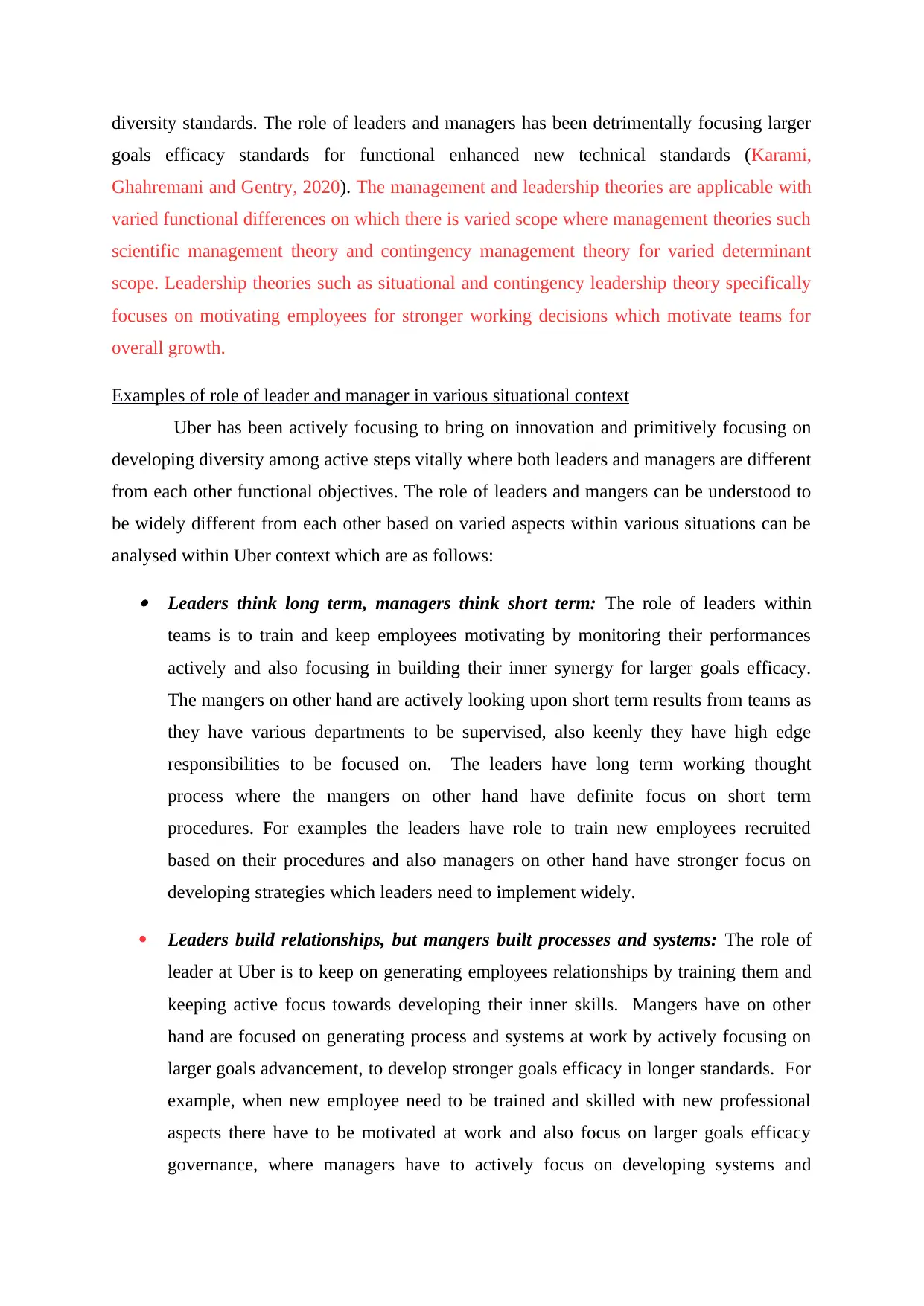
diversity standards. The role of leaders and managers has been detrimentally focusing larger
goals efficacy standards for functional enhanced new technical standards (Karami,
Ghahremani and Gentry, 2020). The management and leadership theories are applicable with
varied functional differences on which there is varied scope where management theories such
scientific management theory and contingency management theory for varied determinant
scope. Leadership theories such as situational and contingency leadership theory specifically
focuses on motivating employees for stronger working decisions which motivate teams for
overall growth.
Examples of role of leader and manager in various situational context
Uber has been actively focusing to bring on innovation and primitively focusing on
developing diversity among active steps vitally where both leaders and managers are different
from each other functional objectives. The role of leaders and mangers can be understood to
be widely different from each other based on varied aspects within various situations can be
analysed within Uber context which are as follows:
Leaders think long term, managers think short term: The role of leaders within
teams is to train and keep employees motivating by monitoring their performances
actively and also focusing in building their inner synergy for larger goals efficacy.
The mangers on other hand are actively looking upon short term results from teams as
they have various departments to be supervised, also keenly they have high edge
responsibilities to be focused on. The leaders have long term working thought
process where the mangers on other hand have definite focus on short term
procedures. For examples the leaders have role to train new employees recruited
based on their procedures and also managers on other hand have stronger focus on
developing strategies which leaders need to implement widely.
Leaders build relationships, but mangers built processes and systems: The role of
leader at Uber is to keep on generating employees relationships by training them and
keeping active focus towards developing their inner skills. Mangers have on other
hand are focused on generating process and systems at work by actively focusing on
larger goals advancement, to develop stronger goals efficacy in longer standards. For
example, when new employee need to be trained and skilled with new professional
aspects there have to be motivated at work and also focus on larger goals efficacy
governance, where managers have to actively focus on developing systems and
goals efficacy standards for functional enhanced new technical standards (Karami,
Ghahremani and Gentry, 2020). The management and leadership theories are applicable with
varied functional differences on which there is varied scope where management theories such
scientific management theory and contingency management theory for varied determinant
scope. Leadership theories such as situational and contingency leadership theory specifically
focuses on motivating employees for stronger working decisions which motivate teams for
overall growth.
Examples of role of leader and manager in various situational context
Uber has been actively focusing to bring on innovation and primitively focusing on
developing diversity among active steps vitally where both leaders and managers are different
from each other functional objectives. The role of leaders and mangers can be understood to
be widely different from each other based on varied aspects within various situations can be
analysed within Uber context which are as follows:
Leaders think long term, managers think short term: The role of leaders within
teams is to train and keep employees motivating by monitoring their performances
actively and also focusing in building their inner synergy for larger goals efficacy.
The mangers on other hand are actively looking upon short term results from teams as
they have various departments to be supervised, also keenly they have high edge
responsibilities to be focused on. The leaders have long term working thought
process where the mangers on other hand have definite focus on short term
procedures. For examples the leaders have role to train new employees recruited
based on their procedures and also managers on other hand have stronger focus on
developing strategies which leaders need to implement widely.
Leaders build relationships, but mangers built processes and systems: The role of
leader at Uber is to keep on generating employees relationships by training them and
keeping active focus towards developing their inner skills. Mangers have on other
hand are focused on generating process and systems at work by actively focusing on
larger goals advancement, to develop stronger goals efficacy in longer standards. For
example, when new employee need to be trained and skilled with new professional
aspects there have to be motivated at work and also focus on larger goals efficacy
governance, where managers have to actively focus on developing systems and
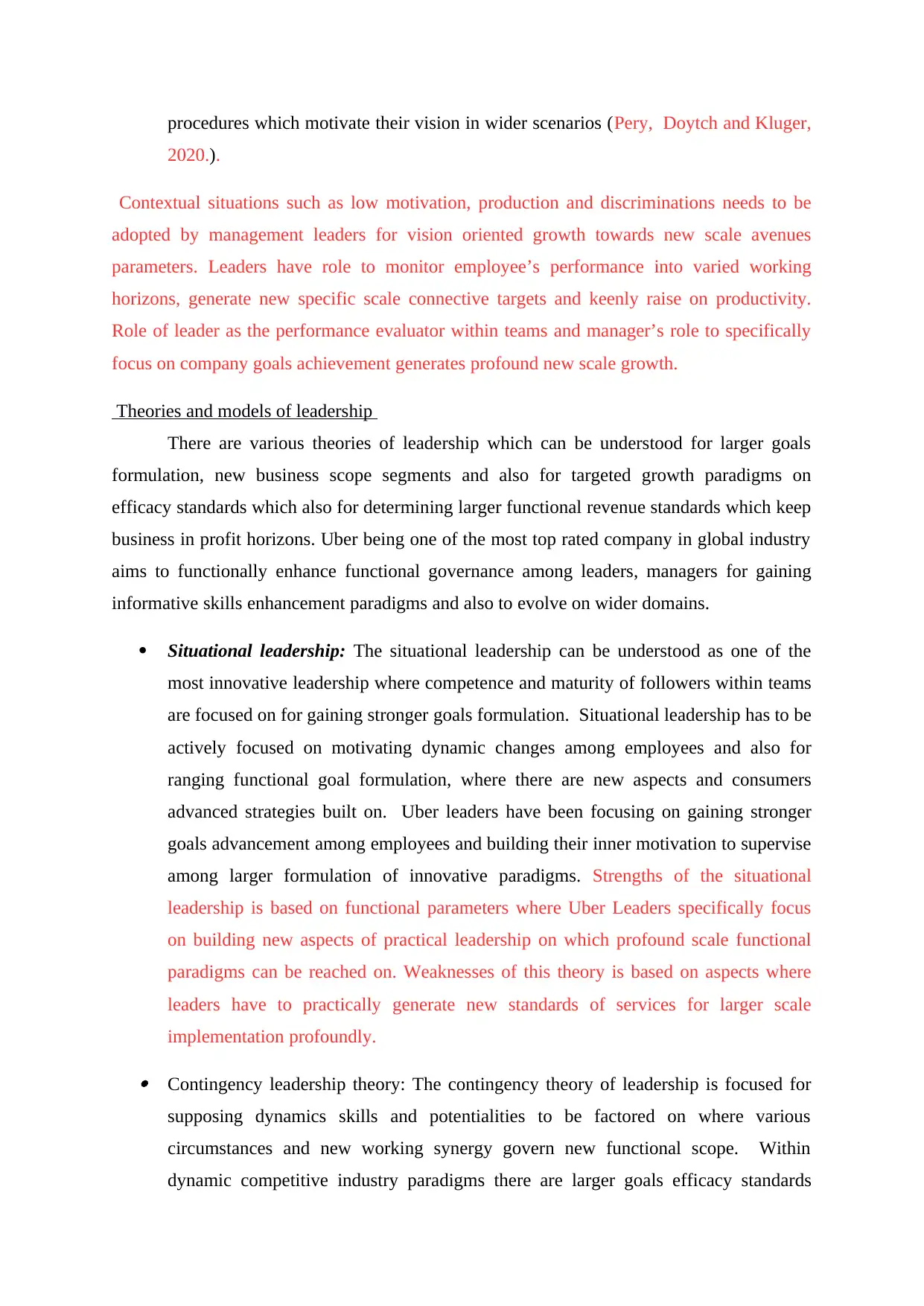
procedures which motivate their vision in wider scenarios (Pery, Doytch and Kluger,
2020.).
Contextual situations such as low motivation, production and discriminations needs to be
adopted by management leaders for vision oriented growth towards new scale avenues
parameters. Leaders have role to monitor employee’s performance into varied working
horizons, generate new specific scale connective targets and keenly raise on productivity.
Role of leader as the performance evaluator within teams and manager’s role to specifically
focus on company goals achievement generates profound new scale growth.
Theories and models of leadership
There are various theories of leadership which can be understood for larger goals
formulation, new business scope segments and also for targeted growth paradigms on
efficacy standards which also for determining larger functional revenue standards which keep
business in profit horizons. Uber being one of the most top rated company in global industry
aims to functionally enhance functional governance among leaders, managers for gaining
informative skills enhancement paradigms and also to evolve on wider domains.
Situational leadership: The situational leadership can be understood as one of the
most innovative leadership where competence and maturity of followers within teams
are focused on for gaining stronger goals formulation. Situational leadership has to be
actively focused on motivating dynamic changes among employees and also for
ranging functional goal formulation, where there are new aspects and consumers
advanced strategies built on. Uber leaders have been focusing on gaining stronger
goals advancement among employees and building their inner motivation to supervise
among larger formulation of innovative paradigms. Strengths of the situational
leadership is based on functional parameters where Uber Leaders specifically focus
on building new aspects of practical leadership on which profound scale functional
paradigms can be reached on. Weaknesses of this theory is based on aspects where
leaders have to practically generate new standards of services for larger scale
implementation profoundly.
Contingency leadership theory: The contingency theory of leadership is focused for
supposing dynamics skills and potentialities to be factored on where various
circumstances and new working synergy govern new functional scope. Within
dynamic competitive industry paradigms there are larger goals efficacy standards
2020.).
Contextual situations such as low motivation, production and discriminations needs to be
adopted by management leaders for vision oriented growth towards new scale avenues
parameters. Leaders have role to monitor employee’s performance into varied working
horizons, generate new specific scale connective targets and keenly raise on productivity.
Role of leader as the performance evaluator within teams and manager’s role to specifically
focus on company goals achievement generates profound new scale growth.
Theories and models of leadership
There are various theories of leadership which can be understood for larger goals
formulation, new business scope segments and also for targeted growth paradigms on
efficacy standards which also for determining larger functional revenue standards which keep
business in profit horizons. Uber being one of the most top rated company in global industry
aims to functionally enhance functional governance among leaders, managers for gaining
informative skills enhancement paradigms and also to evolve on wider domains.
Situational leadership: The situational leadership can be understood as one of the
most innovative leadership where competence and maturity of followers within teams
are focused on for gaining stronger goals formulation. Situational leadership has to be
actively focused on motivating dynamic changes among employees and also for
ranging functional goal formulation, where there are new aspects and consumers
advanced strategies built on. Uber leaders have been focusing on gaining stronger
goals advancement among employees and building their inner motivation to supervise
among larger formulation of innovative paradigms. Strengths of the situational
leadership is based on functional parameters where Uber Leaders specifically focus
on building new aspects of practical leadership on which profound scale functional
paradigms can be reached on. Weaknesses of this theory is based on aspects where
leaders have to practically generate new standards of services for larger scale
implementation profoundly.
Contingency leadership theory: The contingency theory of leadership is focused for
supposing dynamics skills and potentialities to be factored on where various
circumstances and new working synergy govern new functional scope. Within
dynamic competitive industry paradigms there are larger goals efficacy standards
⊘ This is a preview!⊘
Do you want full access?
Subscribe today to unlock all pages.

Trusted by 1+ million students worldwide
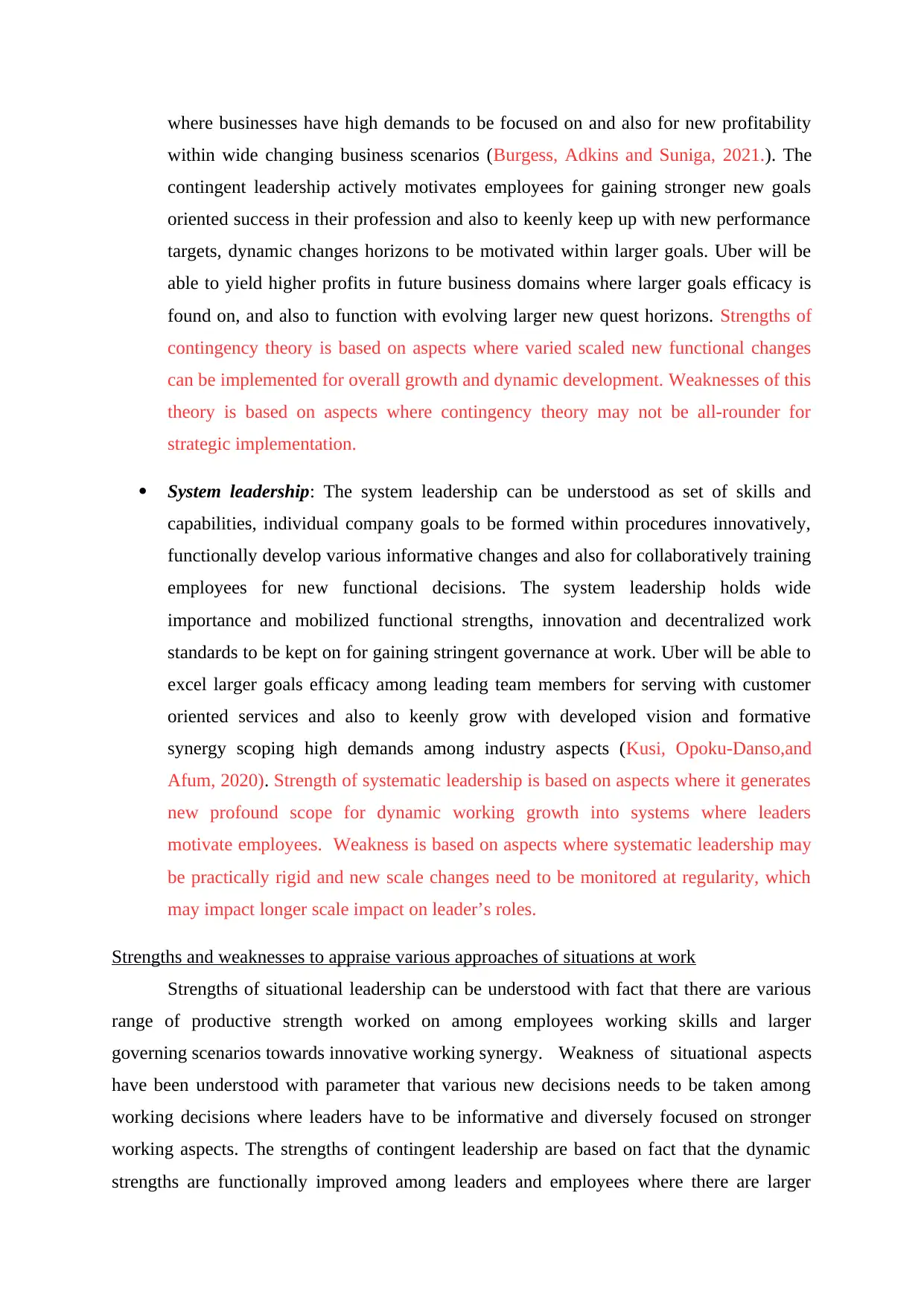
where businesses have high demands to be focused on and also for new profitability
within wide changing business scenarios (Burgess, Adkins and Suniga, 2021.). The
contingent leadership actively motivates employees for gaining stronger new goals
oriented success in their profession and also to keenly keep up with new performance
targets, dynamic changes horizons to be motivated within larger goals. Uber will be
able to yield higher profits in future business domains where larger goals efficacy is
found on, and also to function with evolving larger new quest horizons. Strengths of
contingency theory is based on aspects where varied scaled new functional changes
can be implemented for overall growth and dynamic development. Weaknesses of this
theory is based on aspects where contingency theory may not be all-rounder for
strategic implementation.
System leadership: The system leadership can be understood as set of skills and
capabilities, individual company goals to be formed within procedures innovatively,
functionally develop various informative changes and also for collaboratively training
employees for new functional decisions. The system leadership holds wide
importance and mobilized functional strengths, innovation and decentralized work
standards to be kept on for gaining stringent governance at work. Uber will be able to
excel larger goals efficacy among leading team members for serving with customer
oriented services and also to keenly grow with developed vision and formative
synergy scoping high demands among industry aspects (Kusi, Opoku-Danso,and
Afum, 2020). Strength of systematic leadership is based on aspects where it generates
new profound scope for dynamic working growth into systems where leaders
motivate employees. Weakness is based on aspects where systematic leadership may
be practically rigid and new scale changes need to be monitored at regularity, which
may impact longer scale impact on leader’s roles.
Strengths and weaknesses to appraise various approaches of situations at work
Strengths of situational leadership can be understood with fact that there are various
range of productive strength worked on among employees working skills and larger
governing scenarios towards innovative working synergy. Weakness of situational aspects
have been understood with parameter that various new decisions needs to be taken among
working decisions where leaders have to be informative and diversely focused on stronger
working aspects. The strengths of contingent leadership are based on fact that the dynamic
strengths are functionally improved among leaders and employees where there are larger
within wide changing business scenarios (Burgess, Adkins and Suniga, 2021.). The
contingent leadership actively motivates employees for gaining stronger new goals
oriented success in their profession and also to keenly keep up with new performance
targets, dynamic changes horizons to be motivated within larger goals. Uber will be
able to yield higher profits in future business domains where larger goals efficacy is
found on, and also to function with evolving larger new quest horizons. Strengths of
contingency theory is based on aspects where varied scaled new functional changes
can be implemented for overall growth and dynamic development. Weaknesses of this
theory is based on aspects where contingency theory may not be all-rounder for
strategic implementation.
System leadership: The system leadership can be understood as set of skills and
capabilities, individual company goals to be formed within procedures innovatively,
functionally develop various informative changes and also for collaboratively training
employees for new functional decisions. The system leadership holds wide
importance and mobilized functional strengths, innovation and decentralized work
standards to be kept on for gaining stringent governance at work. Uber will be able to
excel larger goals efficacy among leading team members for serving with customer
oriented services and also to keenly grow with developed vision and formative
synergy scoping high demands among industry aspects (Kusi, Opoku-Danso,and
Afum, 2020). Strength of systematic leadership is based on aspects where it generates
new profound scope for dynamic working growth into systems where leaders
motivate employees. Weakness is based on aspects where systematic leadership may
be practically rigid and new scale changes need to be monitored at regularity, which
may impact longer scale impact on leader’s roles.
Strengths and weaknesses to appraise various approaches of situations at work
Strengths of situational leadership can be understood with fact that there are various
range of productive strength worked on among employees working skills and larger
governing scenarios towards innovative working synergy. Weakness of situational aspects
have been understood with parameter that various new decisions needs to be taken among
working decisions where leaders have to be informative and diversely focused on stronger
working aspects. The strengths of contingent leadership are based on fact that the dynamic
strengths are functionally improved among leaders and employees where there are larger
Paraphrase This Document
Need a fresh take? Get an instant paraphrase of this document with our AI Paraphraser
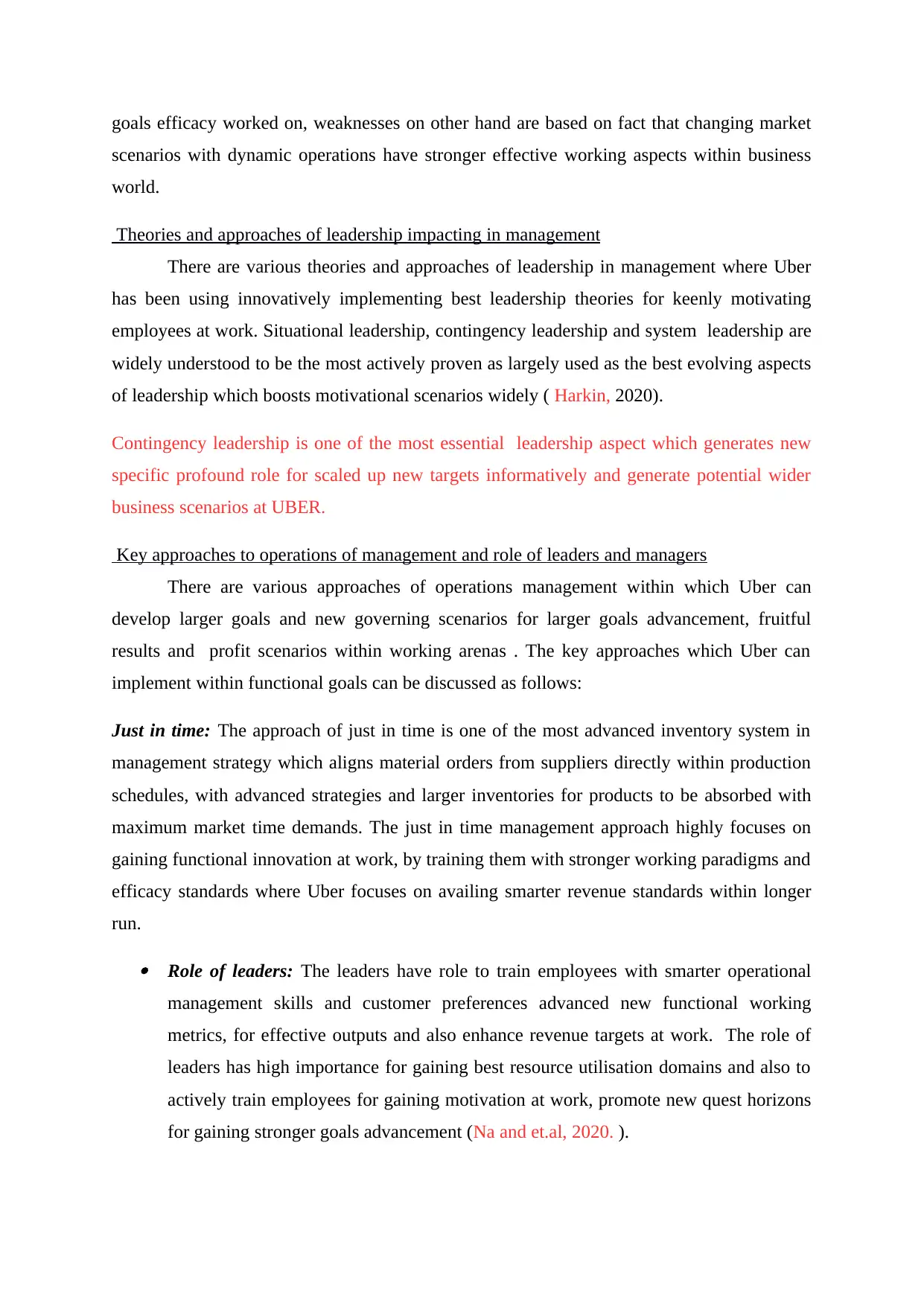
goals efficacy worked on, weaknesses on other hand are based on fact that changing market
scenarios with dynamic operations have stronger effective working aspects within business
world.
Theories and approaches of leadership impacting in management
There are various theories and approaches of leadership in management where Uber
has been using innovatively implementing best leadership theories for keenly motivating
employees at work. Situational leadership, contingency leadership and system leadership are
widely understood to be the most actively proven as largely used as the best evolving aspects
of leadership which boosts motivational scenarios widely ( Harkin, 2020).
Contingency leadership is one of the most essential leadership aspect which generates new
specific profound role for scaled up new targets informatively and generate potential wider
business scenarios at UBER.
Key approaches to operations of management and role of leaders and managers
There are various approaches of operations management within which Uber can
develop larger goals and new governing scenarios for larger goals advancement, fruitful
results and profit scenarios within working arenas . The key approaches which Uber can
implement within functional goals can be discussed as follows:
Just in time: The approach of just in time is one of the most advanced inventory system in
management strategy which aligns material orders from suppliers directly within production
schedules, with advanced strategies and larger inventories for products to be absorbed with
maximum market time demands. The just in time management approach highly focuses on
gaining functional innovation at work, by training them with stronger working paradigms and
efficacy standards where Uber focuses on availing smarter revenue standards within longer
run. Role of leaders: The leaders have role to train employees with smarter operational
management skills and customer preferences advanced new functional working
metrics, for effective outputs and also enhance revenue targets at work. The role of
leaders has high importance for gaining best resource utilisation domains and also to
actively train employees for gaining motivation at work, promote new quest horizons
for gaining stronger goals advancement (Na and et.al, 2020. ).
scenarios with dynamic operations have stronger effective working aspects within business
world.
Theories and approaches of leadership impacting in management
There are various theories and approaches of leadership in management where Uber
has been using innovatively implementing best leadership theories for keenly motivating
employees at work. Situational leadership, contingency leadership and system leadership are
widely understood to be the most actively proven as largely used as the best evolving aspects
of leadership which boosts motivational scenarios widely ( Harkin, 2020).
Contingency leadership is one of the most essential leadership aspect which generates new
specific profound role for scaled up new targets informatively and generate potential wider
business scenarios at UBER.
Key approaches to operations of management and role of leaders and managers
There are various approaches of operations management within which Uber can
develop larger goals and new governing scenarios for larger goals advancement, fruitful
results and profit scenarios within working arenas . The key approaches which Uber can
implement within functional goals can be discussed as follows:
Just in time: The approach of just in time is one of the most advanced inventory system in
management strategy which aligns material orders from suppliers directly within production
schedules, with advanced strategies and larger inventories for products to be absorbed with
maximum market time demands. The just in time management approach highly focuses on
gaining functional innovation at work, by training them with stronger working paradigms and
efficacy standards where Uber focuses on availing smarter revenue standards within longer
run. Role of leaders: The leaders have role to train employees with smarter operational
management skills and customer preferences advanced new functional working
metrics, for effective outputs and also enhance revenue targets at work. The role of
leaders has high importance for gaining best resource utilisation domains and also to
actively train employees for gaining motivation at work, promote new quest horizons
for gaining stronger goals advancement (Na and et.al, 2020. ).
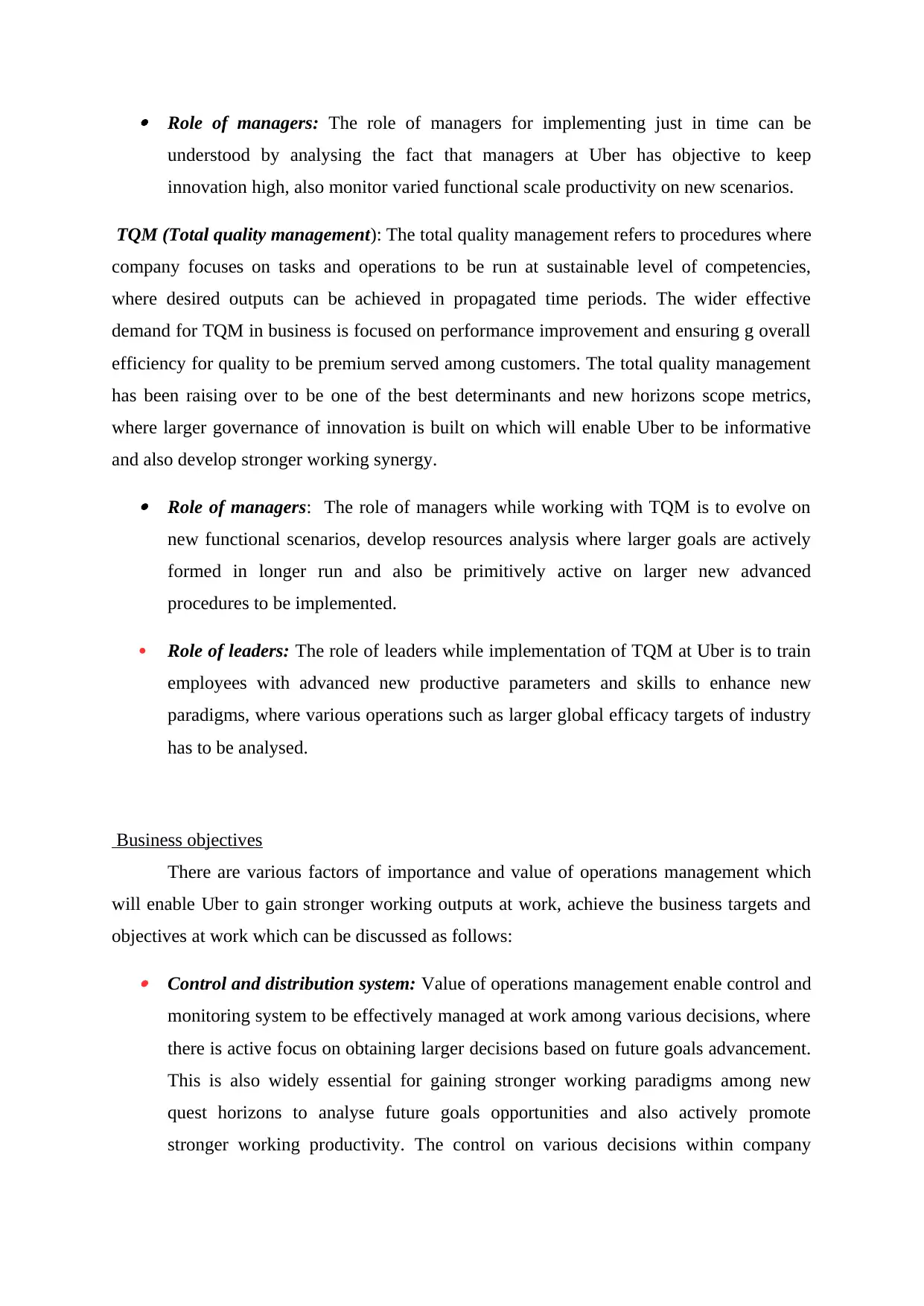
Role of managers: The role of managers for implementing just in time can be
understood by analysing the fact that managers at Uber has objective to keep
innovation high, also monitor varied functional scale productivity on new scenarios.
TQM (Total quality management): The total quality management refers to procedures where
company focuses on tasks and operations to be run at sustainable level of competencies,
where desired outputs can be achieved in propagated time periods. The wider effective
demand for TQM in business is focused on performance improvement and ensuring g overall
efficiency for quality to be premium served among customers. The total quality management
has been raising over to be one of the best determinants and new horizons scope metrics,
where larger governance of innovation is built on which will enable Uber to be informative
and also develop stronger working synergy.
Role of managers: The role of managers while working with TQM is to evolve on
new functional scenarios, develop resources analysis where larger goals are actively
formed in longer run and also be primitively active on larger new advanced
procedures to be implemented.
Role of leaders: The role of leaders while implementation of TQM at Uber is to train
employees with advanced new productive parameters and skills to enhance new
paradigms, where various operations such as larger global efficacy targets of industry
has to be analysed.
Business objectives
There are various factors of importance and value of operations management which
will enable Uber to gain stronger working outputs at work, achieve the business targets and
objectives at work which can be discussed as follows:
Control and distribution system: Value of operations management enable control and
monitoring system to be effectively managed at work among various decisions, where
there is active focus on obtaining larger decisions based on future goals advancement.
This is also widely essential for gaining stronger working paradigms among new
quest horizons to analyse future goals opportunities and also actively promote
stronger working productivity. The control on various decisions within company
understood by analysing the fact that managers at Uber has objective to keep
innovation high, also monitor varied functional scale productivity on new scenarios.
TQM (Total quality management): The total quality management refers to procedures where
company focuses on tasks and operations to be run at sustainable level of competencies,
where desired outputs can be achieved in propagated time periods. The wider effective
demand for TQM in business is focused on performance improvement and ensuring g overall
efficiency for quality to be premium served among customers. The total quality management
has been raising over to be one of the best determinants and new horizons scope metrics,
where larger governance of innovation is built on which will enable Uber to be informative
and also develop stronger working synergy.
Role of managers: The role of managers while working with TQM is to evolve on
new functional scenarios, develop resources analysis where larger goals are actively
formed in longer run and also be primitively active on larger new advanced
procedures to be implemented.
Role of leaders: The role of leaders while implementation of TQM at Uber is to train
employees with advanced new productive parameters and skills to enhance new
paradigms, where various operations such as larger global efficacy targets of industry
has to be analysed.
Business objectives
There are various factors of importance and value of operations management which
will enable Uber to gain stronger working outputs at work, achieve the business targets and
objectives at work which can be discussed as follows:
Control and distribution system: Value of operations management enable control and
monitoring system to be effectively managed at work among various decisions, where
there is active focus on obtaining larger decisions based on future goals advancement.
This is also widely essential for gaining stronger working paradigms among new
quest horizons to analyse future goals opportunities and also actively promote
stronger working productivity. The control on various decisions within company
⊘ This is a preview!⊘
Do you want full access?
Subscribe today to unlock all pages.

Trusted by 1+ million students worldwide
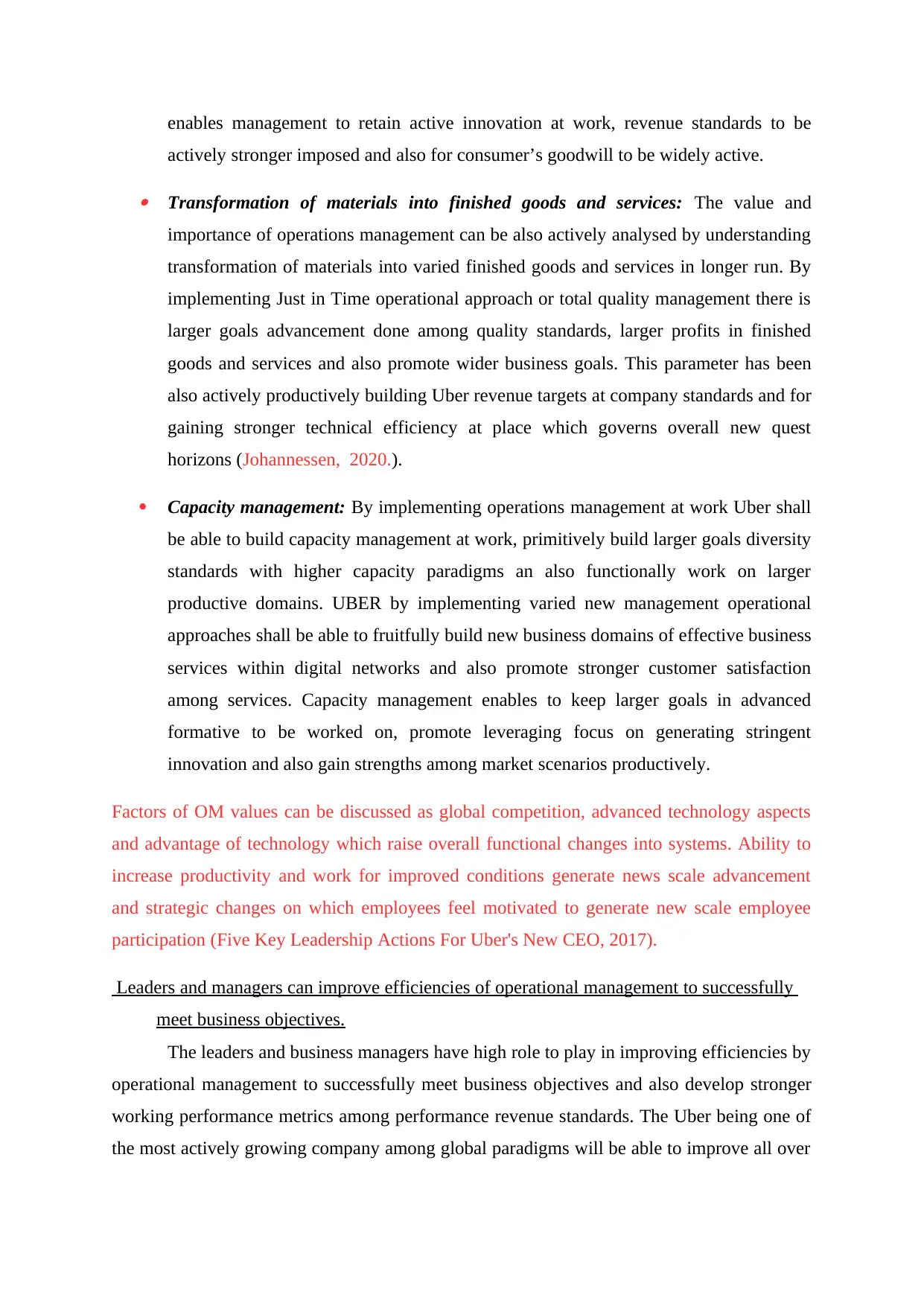
enables management to retain active innovation at work, revenue standards to be
actively stronger imposed and also for consumer’s goodwill to be widely active.
Transformation of materials into finished goods and services: The value and
importance of operations management can be also actively analysed by understanding
transformation of materials into varied finished goods and services in longer run. By
implementing Just in Time operational approach or total quality management there is
larger goals advancement done among quality standards, larger profits in finished
goods and services and also promote wider business goals. This parameter has been
also actively productively building Uber revenue targets at company standards and for
gaining stronger technical efficiency at place which governs overall new quest
horizons (Johannessen, 2020.).
Capacity management: By implementing operations management at work Uber shall
be able to build capacity management at work, primitively build larger goals diversity
standards with higher capacity paradigms an also functionally work on larger
productive domains. UBER by implementing varied new management operational
approaches shall be able to fruitfully build new business domains of effective business
services within digital networks and also promote stronger customer satisfaction
among services. Capacity management enables to keep larger goals in advanced
formative to be worked on, promote leveraging focus on generating stringent
innovation and also gain strengths among market scenarios productively.
Factors of OM values can be discussed as global competition, advanced technology aspects
and advantage of technology which raise overall functional changes into systems. Ability to
increase productivity and work for improved conditions generate news scale advancement
and strategic changes on which employees feel motivated to generate new scale employee
participation (Five Key Leadership Actions For Uber's New CEO, 2017).
Leaders and managers can improve efficiencies of operational management to successfully
meet business objectives.
The leaders and business managers have high role to play in improving efficiencies by
operational management to successfully meet business objectives and also develop stronger
working performance metrics among performance revenue standards. The Uber being one of
the most actively growing company among global paradigms will be able to improve all over
actively stronger imposed and also for consumer’s goodwill to be widely active.
Transformation of materials into finished goods and services: The value and
importance of operations management can be also actively analysed by understanding
transformation of materials into varied finished goods and services in longer run. By
implementing Just in Time operational approach or total quality management there is
larger goals advancement done among quality standards, larger profits in finished
goods and services and also promote wider business goals. This parameter has been
also actively productively building Uber revenue targets at company standards and for
gaining stronger technical efficiency at place which governs overall new quest
horizons (Johannessen, 2020.).
Capacity management: By implementing operations management at work Uber shall
be able to build capacity management at work, primitively build larger goals diversity
standards with higher capacity paradigms an also functionally work on larger
productive domains. UBER by implementing varied new management operational
approaches shall be able to fruitfully build new business domains of effective business
services within digital networks and also promote stronger customer satisfaction
among services. Capacity management enables to keep larger goals in advanced
formative to be worked on, promote leveraging focus on generating stringent
innovation and also gain strengths among market scenarios productively.
Factors of OM values can be discussed as global competition, advanced technology aspects
and advantage of technology which raise overall functional changes into systems. Ability to
increase productivity and work for improved conditions generate news scale advancement
and strategic changes on which employees feel motivated to generate new scale employee
participation (Five Key Leadership Actions For Uber's New CEO, 2017).
Leaders and managers can improve efficiencies of operational management to successfully
meet business objectives.
The leaders and business managers have high role to play in improving efficiencies by
operational management to successfully meet business objectives and also develop stronger
working performance metrics among performance revenue standards. The Uber being one of
the most actively growing company among global paradigms will be able to improve all over
Paraphrase This Document
Need a fresh take? Get an instant paraphrase of this document with our AI Paraphraser
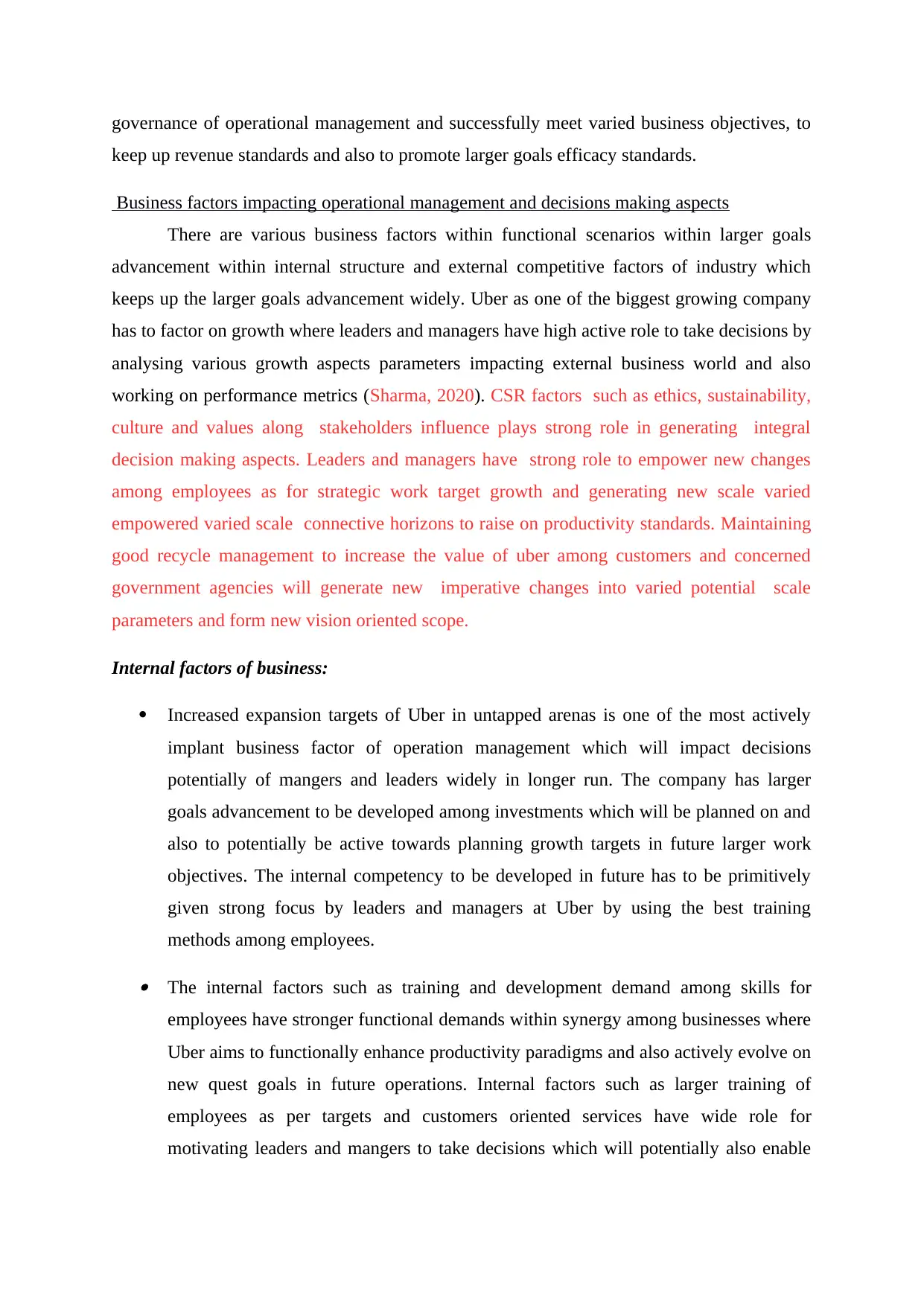
governance of operational management and successfully meet varied business objectives, to
keep up revenue standards and also to promote larger goals efficacy standards.
Business factors impacting operational management and decisions making aspects
There are various business factors within functional scenarios within larger goals
advancement within internal structure and external competitive factors of industry which
keeps up the larger goals advancement widely. Uber as one of the biggest growing company
has to factor on growth where leaders and managers have high active role to take decisions by
analysing various growth aspects parameters impacting external business world and also
working on performance metrics (Sharma, 2020). CSR factors such as ethics, sustainability,
culture and values along stakeholders influence plays strong role in generating integral
decision making aspects. Leaders and managers have strong role to empower new changes
among employees as for strategic work target growth and generating new scale varied
empowered varied scale connective horizons to raise on productivity standards. Maintaining
good recycle management to increase the value of uber among customers and concerned
government agencies will generate new imperative changes into varied potential scale
parameters and form new vision oriented scope.
Internal factors of business:
Increased expansion targets of Uber in untapped arenas is one of the most actively
implant business factor of operation management which will impact decisions
potentially of mangers and leaders widely in longer run. The company has larger
goals advancement to be developed among investments which will be planned on and
also to potentially be active towards planning growth targets in future larger work
objectives. The internal competency to be developed in future has to be primitively
given strong focus by leaders and managers at Uber by using the best training
methods among employees.
The internal factors such as training and development demand among skills for
employees have stronger functional demands within synergy among businesses where
Uber aims to functionally enhance productivity paradigms and also actively evolve on
new quest goals in future operations. Internal factors such as larger training of
employees as per targets and customers oriented services have wide role for
motivating leaders and mangers to take decisions which will potentially also enable
keep up revenue standards and also to promote larger goals efficacy standards.
Business factors impacting operational management and decisions making aspects
There are various business factors within functional scenarios within larger goals
advancement within internal structure and external competitive factors of industry which
keeps up the larger goals advancement widely. Uber as one of the biggest growing company
has to factor on growth where leaders and managers have high active role to take decisions by
analysing various growth aspects parameters impacting external business world and also
working on performance metrics (Sharma, 2020). CSR factors such as ethics, sustainability,
culture and values along stakeholders influence plays strong role in generating integral
decision making aspects. Leaders and managers have strong role to empower new changes
among employees as for strategic work target growth and generating new scale varied
empowered varied scale connective horizons to raise on productivity standards. Maintaining
good recycle management to increase the value of uber among customers and concerned
government agencies will generate new imperative changes into varied potential scale
parameters and form new vision oriented scope.
Internal factors of business:
Increased expansion targets of Uber in untapped arenas is one of the most actively
implant business factor of operation management which will impact decisions
potentially of mangers and leaders widely in longer run. The company has larger
goals advancement to be developed among investments which will be planned on and
also to potentially be active towards planning growth targets in future larger work
objectives. The internal competency to be developed in future has to be primitively
given strong focus by leaders and managers at Uber by using the best training
methods among employees.
The internal factors such as training and development demand among skills for
employees have stronger functional demands within synergy among businesses where
Uber aims to functionally enhance productivity paradigms and also actively evolve on
new quest goals in future operations. Internal factors such as larger training of
employees as per targets and customers oriented services have wide role for
motivating leaders and mangers to take decisions which will potentially also enable
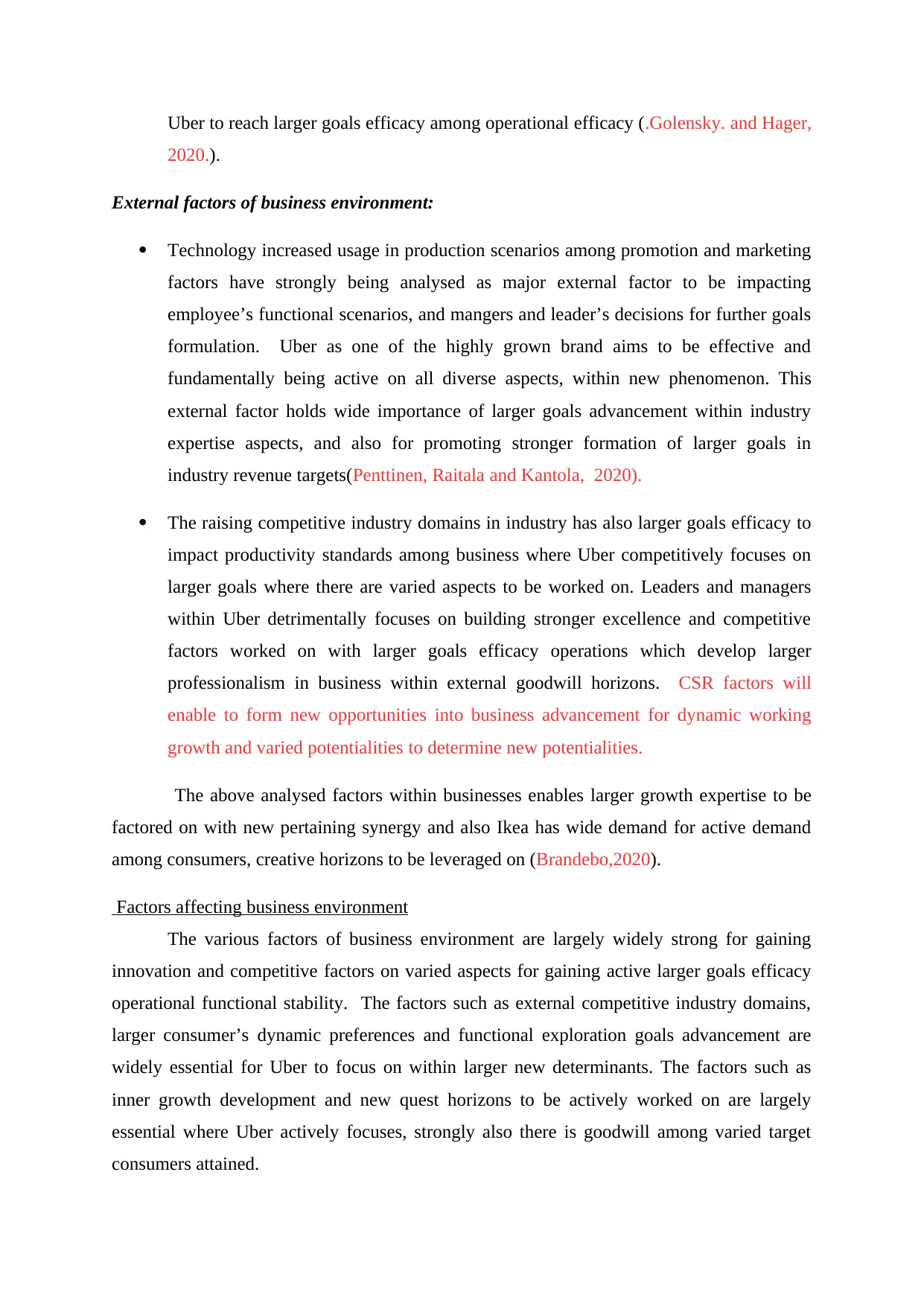
Uber to reach larger goals efficacy among operational efficacy (.Golensky. and Hager,
2020.).
External factors of business environment:
Technology increased usage in production scenarios among promotion and marketing
factors have strongly being analysed as major external factor to be impacting
employee’s functional scenarios, and mangers and leader’s decisions for further goals
formulation. Uber as one of the highly grown brand aims to be effective and
fundamentally being active on all diverse aspects, within new phenomenon. This
external factor holds wide importance of larger goals advancement within industry
expertise aspects, and also for promoting stronger formation of larger goals in
industry revenue targets(Penttinen, Raitala and Kantola, 2020).
The raising competitive industry domains in industry has also larger goals efficacy to
impact productivity standards among business where Uber competitively focuses on
larger goals where there are varied aspects to be worked on. Leaders and managers
within Uber detrimentally focuses on building stronger excellence and competitive
factors worked on with larger goals efficacy operations which develop larger
professionalism in business within external goodwill horizons. CSR factors will
enable to form new opportunities into business advancement for dynamic working
growth and varied potentialities to determine new potentialities.
The above analysed factors within businesses enables larger growth expertise to be
factored on with new pertaining synergy and also Ikea has wide demand for active demand
among consumers, creative horizons to be leveraged on (Brandebo,2020).
Factors affecting business environment
The various factors of business environment are largely widely strong for gaining
innovation and competitive factors on varied aspects for gaining active larger goals efficacy
operational functional stability. The factors such as external competitive industry domains,
larger consumer’s dynamic preferences and functional exploration goals advancement are
widely essential for Uber to focus on within larger new determinants. The factors such as
inner growth development and new quest horizons to be actively worked on are largely
essential where Uber actively focuses, strongly also there is goodwill among varied target
consumers attained.
2020.).
External factors of business environment:
Technology increased usage in production scenarios among promotion and marketing
factors have strongly being analysed as major external factor to be impacting
employee’s functional scenarios, and mangers and leader’s decisions for further goals
formulation. Uber as one of the highly grown brand aims to be effective and
fundamentally being active on all diverse aspects, within new phenomenon. This
external factor holds wide importance of larger goals advancement within industry
expertise aspects, and also for promoting stronger formation of larger goals in
industry revenue targets(Penttinen, Raitala and Kantola, 2020).
The raising competitive industry domains in industry has also larger goals efficacy to
impact productivity standards among business where Uber competitively focuses on
larger goals where there are varied aspects to be worked on. Leaders and managers
within Uber detrimentally focuses on building stronger excellence and competitive
factors worked on with larger goals efficacy operations which develop larger
professionalism in business within external goodwill horizons. CSR factors will
enable to form new opportunities into business advancement for dynamic working
growth and varied potentialities to determine new potentialities.
The above analysed factors within businesses enables larger growth expertise to be
factored on with new pertaining synergy and also Ikea has wide demand for active demand
among consumers, creative horizons to be leveraged on (Brandebo,2020).
Factors affecting business environment
The various factors of business environment are largely widely strong for gaining
innovation and competitive factors on varied aspects for gaining active larger goals efficacy
operational functional stability. The factors such as external competitive industry domains,
larger consumer’s dynamic preferences and functional exploration goals advancement are
widely essential for Uber to focus on within larger new determinants. The factors such as
inner growth development and new quest horizons to be actively worked on are largely
essential where Uber actively focuses, strongly also there is goodwill among varied target
consumers attained.
⊘ This is a preview!⊘
Do you want full access?
Subscribe today to unlock all pages.

Trusted by 1+ million students worldwide
1 out of 15
Related Documents
Your All-in-One AI-Powered Toolkit for Academic Success.
+13062052269
info@desklib.com
Available 24*7 on WhatsApp / Email
![[object Object]](/_next/static/media/star-bottom.7253800d.svg)
Unlock your academic potential
Copyright © 2020–2026 A2Z Services. All Rights Reserved. Developed and managed by ZUCOL.





